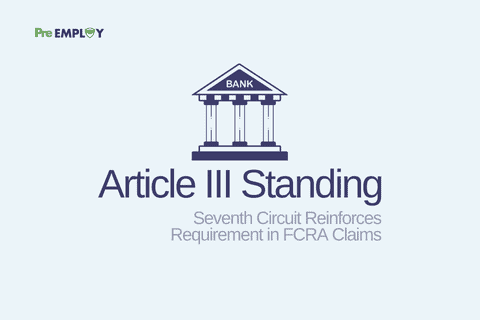Seventh Circuit Reinforces Requirement for Article III Standing in FCRA Claims

November 9, 2022
In a recent ruling from the U.S. Court of Appeals for the Seventh Circuit, the court affirmed the dismissal of a claim under the federal Fair Credit Reporting Act (FCRA). In addition, the ruling clarified the standards for establishing standing in FCRA claims.
In this case, the plaintiff had alleged that the defendant, a bank that held a loan with the plaintiff, had failed to investigate two disputes properly. As a result, as a furnisher of credit information under the FCRA, the bank allegedly breached the implied duty of good faith and fair dealing, fiduciary duty, and more. In response, the defendant counterclaimed, seeking judgment on the loan at the core of the issue and summary judgment on the plaintiff’s claims.
The court found that the plaintiff failed to prove traceable damages as an element of his claim. In the suit, the plaintiff asserted that his credit score suffered because the defendant allegedly neglected to investigate the disputes filed through consumer reporting agencies. As a result, it granted summary judgment to the defendant for the FCRA claims. Furthermore, the district court called the plaintiff’s primary evidence in opposing the defendant’s motion for summary judgment speculative and conclusory. Thus, the court granted the defendant’s motion.
The plaintiff appealed these claims to the Seventh Circuit, which began analyzing the plaintiff’s argument regarding the validity of his affidavit. First, the plaintiff argued the belief that the lower court incorrectly found his affidavit as conclusory and speculative based on the few examples used to justify the conclusion.
However, the appeals court rejected this argument, explaining that courts may decide the credibility of affidavits and other forms of evidence. Further, it determined that the plaintiff’s claims of fiduciary duty and contract breaches were unsupported by evidence. Thus, the appeals court affirmed the lower court’s summary judgment ruling.
As for the plaintiff’s claim that the furnisher violated the FCRA, the appeals court decided that the lower court had applied the incorrect standard in granting summary judgment. Instead, the district court relied on the plaintiff to prove damages as an element of his FCRA claim.
The appeals court revealed this is not the correct standard for claims of a failure to investigate under § 1681s-2(b)(1)(A). However, the court still affirmed the summary judgment ruling on separate grounds. Specifically, the court found that the plaintiff must demonstrate an injury under Article III, not simply a statutory violation.
The plaintiff claimed that he suffered harm to his credit score in November 2011 due to the defendant’s failure to investigate his claims reasonably. However, the court found this harm not adequately traceable to the defendant’s inaction in response to the disputes, which occurred in January 2012 after the change in his credit score.
As a result, the court affirmed the dismissal of the plaintiff’s FCRA claims. This decision reinforces the necessity to establish Article III standing for plaintiffs to assert claims under the FCRA.
Keep your business up to date on new laws and regulations with Pre-employ’s free news resources. Contact a sales rep today.
